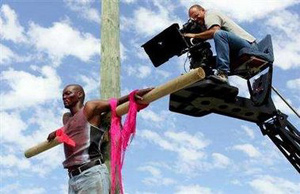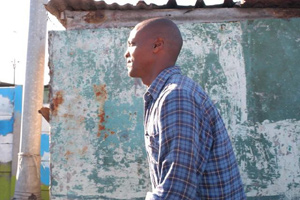Son of Man stuns Sundance
25 January 2006
Accolades are pouring in for Son of Man, a new South African film that sets the life of Jesus Christ in contemporary Africa, after its world premier at the Sundance Film Festival in the US state of Utah on Sunday.
Eminent cinema critic Roger Ebert of the Chicago Sun-Times described Son of Man as continuing "the South African film renaissance" - and as "one of the most extraordinary and powerful films at Sundance".
"This is the story of Jesus, told in episodes from the New Testament, but set in present-day Africa," Ebert said.
"This is a Jesus who says the same sorts of things he says in the Bible, is not 'updated' except in some of his terms of reference, and yet sends an unmistakable message: if Jesus were alive today, he would be singled out as a dangerous political leader, just as he was the first time around."
First SA film for Sundance
From the producers of the award-winning
U-Carmen eKhayelitsha, Son of Man is the first South African film to be entered in the prestigious US festival, which has showcased independent cinema for 25 years.
It is the second feature by the Stellenbosch-based Dimpho Di Kopane theatre company, which won the Golden Bear Award at the 2005 Berlin International Film Festival. It was made in association with Spier Films, Film and Music Entertainment, and Nando's.
Andile Kosi plays Jesus, who is born in the state of Judea in southern Africa, where violence and poverty are rife. As civil war breaks out, Jesus demands that his followers foreswear warfare and follow a life of peace.
Directed and co-written by U-Carmen director Mark Dornford-May, Son of Man is described as "the Gospels retold as a story of corruption and redemption in contemporary Africa". It is filmed in isiXhosa, English and Setswana, with English subtitles.
"The movie has relatively little spoken dialogue, but a great
deal of music - that joyous, full-throated South African music that combines great technical skill with great heart," Ebert said.
"Some of the best moments belong to a chorus singing the praises of the Lord. Others belong to an actress named Pauline Malefane, who plays Mary, and sings in celebration after being told she will be the mother of Jesus."
Satan in black leather
Jesus is born in a shanty-town shed, not a Bethlehem stable. He begins his ministry after an encounter with Satan (Andries Mbali) - dressed in black leather - during his traditional Xhosa circumcision rite.
His mother Mary is a virgin, though feisty enough to argue with the angels. The angels in Son of Man are small African boys with a few feathers attached here and there. Jesus's disciplines, who include women, follow him through the townships of Cape Town as he preaches non-violence.
Television news tells of occupying forces and uprisings, the modern
version of the Roman concern with the Jews. Judas spies on Jesus with a video camera. Gun-wielding authorities fear his message of equality and he ends up hanging on a cross.

"The secret of the movie is that it doesn't strain to draw parallels with current world events - because it doesn't have to," Ebert said.
Written by Dornford-May, Andiswa Kedama and Pauline Malefane, the star of U-Carmen eKhayelitsha, the 90-minute feature was shot in Khayelitsha and the Eastern Cape and completed earlier in January.
Son of Man was inspired by Dimpho Di Kopane's theatre piece The Mysteries, which has been staged successfully for the past four years.
The story of The Mysteries covers the Creation through to the birth, life and death of Jesus Christ.

'Christ has been hijacked a bit'
"We wanted to look at the Gospels as if they were written by spin doctors and to strip that away and look at the truth," Dornford-May told Reuters.
"The truth is that Christ was born in an occupied state and preached equality at a time when that wasn't very acceptable."
By portraying Jesus as a black African, Dornford-May hopes to sharpen the political context of the Gospels, when Israel was under Roman occupation, and challenge Western perceptions of Christ as meek, mild and European.
"We have to accept that Christ has been hijacked a bit - he's gone very blonde-haired and blue-eyed," he said.
"The important thing about the message of Christ was that it is universal. It doesn't matter what he looked like."
SouthAfrica.info reporter


| 
























